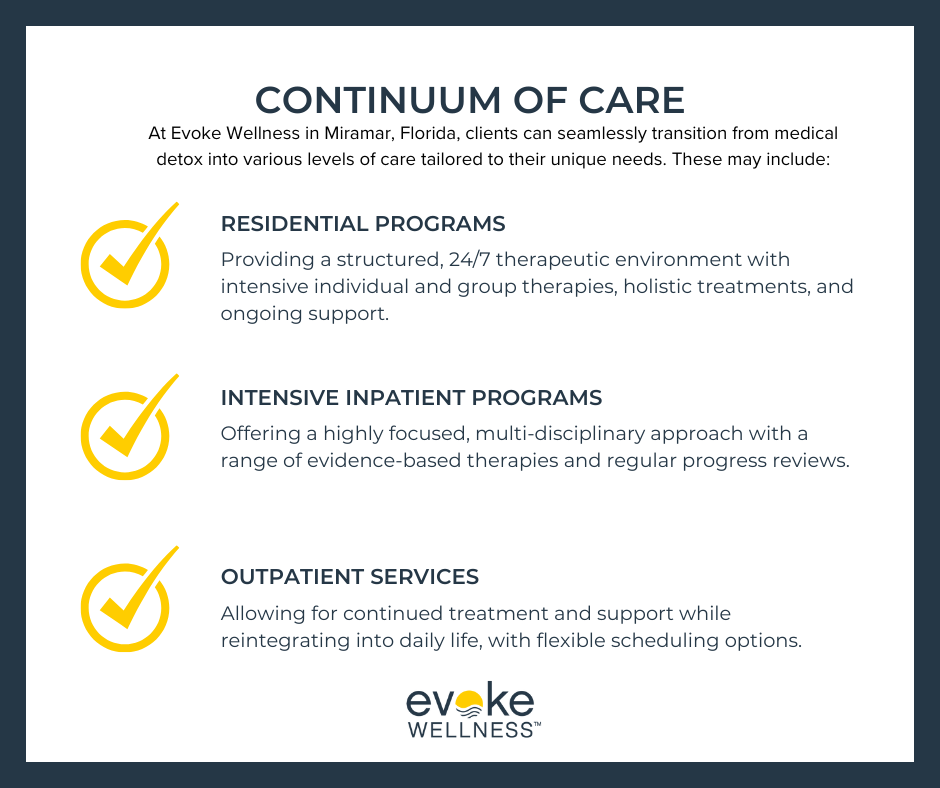Completing detox is a crucial first step, but it’s only the beginning of your journey to lasting sobriety. As you emerge from the fog of withdrawal, you face the daunting task of rebuilding your life and maintaining your hard-won recovery. This guide will equip you with essential strategies for navigating the challenging post-detox period and setting yourself up for long-term success. Recent studies show that up to 60% of individuals relapse within their first year after treatment, highlighting the critical importance of a comprehensive aftercare plan. By understanding the common pitfalls and arming yourself with effective coping mechanisms, you can dramatically improve your odds of sustained recovery. Let’s explore the key steps you need to take as you transition from detox to a life of lasting sobriety.
Together, let’s embrace the journey to recovery and the promise of a new beginning. Call us at (833) 819-6066 today or reach out online.
The Transition From Detox to Post-Detox
Maintaining Sobriety After Treatment
After completing a detox program, the journey towards long-term recovery is just beginning. It takes approximately 90 days for the brain to reset and regain proper decision-making and analytical functioning to overcome the immediate influence of addiction. This period, known as the “sleeper effect,” is crucial for establishing new, healthy habits and coping mechanisms.
- People who receive at least 90 days of addiction treatment have significantly higher success rates, with only 17% relapsing a year after treatment, compared to 35% of those who received less than 90 days of treatment.
- Ongoing support and maintenance of sobriety is vital for long-term success, as recovery from addiction is a lifelong journey.
Comprehensive Aftercare Support
At Evoke Wellness, our comprehensive aftercare program provides the tools and resources needed to navigate the transition from detox to post-detox. Our evidence-based approach includes:
- Cognitive-behavioral therapy to identify and modify unhealthy thought patterns and behaviors.
- Dual diagnosis support for co-occurring mental health conditions, such as drug-induced schizophrenia.
- Holistic therapies like mindfulness, yoga, and art therapy to develop healthy coping mechanisms.
- Family involvement to strengthen support systems and improve communication.
Building a Foundation for Lasting Recovery
The transition from detox to post-detox is a critical phase that requires a comprehensive approach. At Evoke Wellness, our goal is to equip clients with the skills and tools needed for long-term sobriety, while addressing the long-term effects of alcohol and substance abuse on physical and mental health.
By providing personalized care, evidence-based therapies, and a focus on overall wellness, we empower individuals to build a strong foundation for lasting recovery and a fulfilling, sober life.
Consider Continuing Treatment
After completing an initial addiction treatment program like detox or residential care, many individuals wonder what’s next on their recovery journey. Continuing treatment is often crucial for achieving lasting sobriety and building a strong foundation for a substance-free life.
Transition to a New Level of Care
While detox and residential programs provide a safe, supportive environment to overcome physical dependence and initiate healing, extended residential programs allow individuals to continue cultivating skills and addressing underlying issues. This extended care provides:
- A structured, therapeutic environment free from triggers and unhealthy influences
- More time to work through co-occurring mental health conditions and past traumas
- Opportunities to develop healthy coping mechanisms and build a sober support system
Aftercare and Relapse Prevention
Even after completing a comprehensive treatment program, the risk of relapse remains. Aftercare services like sober living homes, alumni support groups, and ongoing counseling can help individuals navigate the challenges of transitioning back to daily life. These services reinforce the tools learned in treatment and provide a safety net during this vulnerable period.
Addressing Co-Occurring Disorders
For those with dual diagnoses, addressing both substance use and mental health disorders is crucial. Evoke Wellness offers integrated treatment plans that combine evidence-based therapies like CBT and DBT with medication management. This comprehensive approach improves long-term outcomes and reduces the risk of relapse.
By continuing treatment beyond an initial program, individuals can solidify their commitment to sobriety, build a strong support network, and develop the skills needed to maintain their recovery for years to come.
Create a Support System
Develop a Sober Network
Surrounding yourself with a supportive community is vital for sustained sobriety after detox. Participating in 12-step programs like Alcoholics Anonymous (AA) and Narcotics Anonymous (NA) provides an invaluable sober support network. At Evoke Wellness, engaging with these peer groups is mandatory throughout treatment, as studies show higher long-term success rates for those who stay actively involved post-rehab.
You’ll be encouraged to find a sponsor – someone who guides you through the 12 steps and serves as a mentor on your recovery journey. Building authentic connections within the recovery community creates a system of trusted individuals who understand your struggles and can offer advice during challenging times.
Include Family and Loved Ones
Addiction impacts the entire family unit, so it’s crucial to involve loved ones in your recovery process. Family therapy and support groups help mend strained relationships, process trauma, and rebuild trust. Your support system becomes stronger when family members educate themselves on addiction, set healthy boundaries, and learn how to provide compassionate encouragement.
Participating in a family program gives you a safe space to heal together through counseling, shared activities, and open communication. With their commitment, your family can celebrate milestones and keep you motivated on the path to lasting sobriety.
Seek Professional Guidance
In addition to peer and family support, ongoing counseling and therapy are essential components of an effective aftercare plan. Evoke Wellness provides individual counseling, group sessions, and access to resources focused on relapse prevention. A recovery coach helps you navigate challenges, recognize potential triggers, and utilize coping strategies learned in treatment.
Consistent support from addiction professionals ensures you have the tools and guidance needed to maintain sobriety long after leaving a structured treatment environment. Their expertise complements your expanding sober network, creating a comprehensive system to uplift your recovery journey.
Build Healthy Habits and Avoid Triggers
Establish Daily Routines
Creating a structured routine is crucial during recovery. Healthy daily habits like regular sleep schedules, nutritious meals, and exercise can help restore balance and promote overall well-being. This consistency provides a sense of stability and purpose, making it easier to avoid triggers and stay on track.
- Wake up and go to bed at consistent times
- Plan and prepare nutritious meals
- Engage in physical activity or exercise regularly
Identify and Avoid Triggers
Recognizing personal triggers that can lead to cravings or relapse is vital. These can be people, places, emotions or situations that remind you of past substance use. Develop strategies to avoid or cope with these triggers effectively.
- Make a list of your specific triggers
- Alter your environment to minimize exposure
- Practice relaxation techniques when cravings arise
Cultivate Healthy Coping Mechanisms
Replacing harmful coping mechanisms with positive outlets is essential. Explore new hobbies, practice mindfulness, seek support from loved ones or join a support group. These activities can provide fulfillment, reduce stress and prevent relapse.
Developing new habits takes time, but persistence is key. According to a study, it can take anywhere from 18 to 254 days to form a new behavior, with an average of 66 days. Be patient and celebrate small victories along the way.
Seek Ongoing Support
Maintaining sobriety is an ongoing journey, and continued support is crucial. Attend counseling, join a peer support group or engage in aftercare programs offered by your treatment facility. This support system can provide accountability, guidance and encouragement.
What Happens After Detoxification?
After completing the medical detox process, the journey towards lasting recovery has just begun. Detox alone is not a complete solution for overcoming addiction – it’s the crucial first step in breaking free from the physical dependence on substances.
Comprehensive Treatment Programs
Transitioning into a comprehensive treatment program is vital for addressing the underlying psychological, emotional, and behavioral aspects of addiction. At Evoke Wellness, individuals have access to various evidence-based treatment options tailored to their unique needs:
- Residential Treatment: Providing a structured, supportive environment away from triggers and temptations, residential programs offer intensive therapy, counseling, and holistic approaches to promote healing and develop essential coping skills.
- Dual Diagnosis Treatment: Recognizing the strong link between substance abuse and mental health disorders, dual diagnosis programs integrate therapies like cognitive-behavioral therapy (CBT) to address both issues concurrently, significantly improving recovery outcomes.
- Medication-Assisted Treatment (MAT): For certain addictions, medications like Suboxone or Vivitrol can help manage cravings and withdrawal symptoms, increasing the chances of sustained sobriety.
Ongoing Support and Aftercare
Recovery is a lifelong journey, and continued support is crucial for maintaining sobriety. Evoke Wellness offers comprehensive aftercare services, including:
- Alumni Programs: Providing a supportive community, mentorship opportunities, and access to ongoing counseling and 12-step meetings.
- Sober Living Homes: Transitional housing that offers a structured, substance-free environment with built-in accountability and peer support.
- Relapse Prevention Strategies: Equipping individuals with effective tools and techniques to identify and manage triggers, build a strong support system, and maintain long-term sobriety.
By addressing the multifaceted aspects of addiction through a comprehensive, evidence-based approach, Evoke Wellness empowers individuals to reclaim their lives and achieve lasting recovery.
FAQ: What is the final step of going through the detox process?
Transitioning to Comprehensive Treatment
The detox process is just the first crucial step towards achieving lasting sobriety. While medical detox helps stabilize physical dependence and cleanse the body, it does not address the underlying psychological and behavioral aspects of addiction. Completing detox alone has low success rates for long-term recovery without follow-up treatment.
To maximize the chances of sustained sobriety, individuals must transition from detox into a comprehensive addiction treatment program. This integrated approach combines medical, psychological, and social services to tackle the multifaceted nature of substance use disorders.

Building a Foundation for Lasting Recovery
The goal of this continuum of care is to equip individuals with the skills, coping mechanisms, and support network necessary for long-term sobriety. Effective treatment addresses the whole person, not just the substance abuse, through a combination of:
- Behavioral therapies (e.g., Cognitive Behavioral Therapy, Dialectical Behavior Therapy)
- Medications to reduce cravings and prevent relapse
- Participation in support groups and peer networks
- Development of healthy lifestyle habits and routines
By transitioning from detox into a structured treatment program, individuals can build a solid foundation for lasting recovery by addressing the root causes of their addiction and developing a personalized path forward.
Conclusion
As you embark on your journey to long-term recovery after detox, remember that success is within reach. By following the steps outlined in this guide—including ongoing therapy, support group participation, and lifestyle changes—you’re setting a strong foundation for lasting sobriety. Recent studies show that individuals who engage in comprehensive aftercare programs have a 60% higher chance of maintaining sobriety after one year compared to those who don’t. Your path forward may present challenges, but with dedication and the right support system, you can overcome obstacles and achieve lasting wellness. Remember, recovery is a lifelong process, and each day sober is a victory worth celebrating. Stay committed to your goals, and a brighter, healthier future awaits you.
Begin Your Journey with Evoke Wellness at Miramar
If you or a loved one is considering treatment, Evoke Wellness at Miramar invites you to contact us. Our compassionate team is ready to answer your questions, discuss your needs, and help you take the first steps toward recovery. In Miramar, you’ll find more than just a treatment program – you’ll discover a community dedicated to your wellness and success. Together, let’s embrace the journey to recovery and the promise of a new beginning. Call us at (833) 819-6066 today or reach out online.


